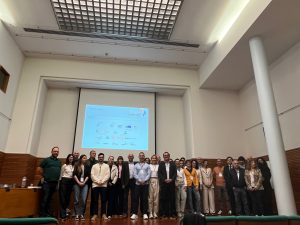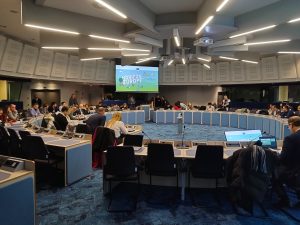ECTE – European Center in Training for Employment is participating in international cooperation consortium of institutions with different backgrounds and expertise in education, urban shared gardens and professional training in Italy, Great Britain, Germany, France, and Greece, to create a European format in the VET
Since ever, societies, all over Europe, have developed experiences promoting diverse practices and forms of solidarity, social assistance, and social inclusion. Community gardens are being recognized as an innovative way to grow food, foster good health, green urban environments, support lifelong learning and cultivate vibrant communities. They bring together people from all walks of life, backgrounds, and ages to foster a lively and connected community. Whilst gardening is the focus, community gardens are generally community hubs for a range of activities – learning and education, playgroups, arts and creative activities, preparing and sharing food, community events, celebrations and social enterprise.
Additionally, we may speak of social farming (or ‘care farming’ or ‘green care’) to describe those farming practices aimed at promoting disadvantaged people’s rehabilitation and care and/or towards the integration of people with ‘low contractual capacity’ (i.e.: psychophysical disabilities, convicts, drug addicts, minors, emigrants).
In Europe, the situation of people of special expertise, having key coordinating role in community gardens’ activities, is quite heterogeneous: some countries, such as France or the United Kingdom, provide, for instance, basic training for these professional figures; in Italy, although such a role exists within the urban gardens, the gardeniser is neither recognised nor has access to training courses or recognition, in Greece, municipalities have allotted land to local citizens, however without any specific specialisation and any access to basic training. The urban shared garden’s coordinator is often a gardener but usually, he/she lacks, competences in the social field or in the inclusion of people at risk of marginalization. On the other hand, in some cases he/she is an educator or a trainer but he/she has weak knowledge and few practical skills in gardening; therefore fundamental is the role of the gardeniser both in the communication towards the external, playing the role of mediator between the gardeners and the institutions, and in the organisation and management of the urban garden’s sustainability. A very complex profile with very complex training needs, including learning and skills in different areas.
The project GARDENISER Pro objective is fostering the employability of workers having a key coordinating role in urban gardens operation, through the creation of a new European professional profile, the “urban garden’s coordinator/ organizer”, or GARDENISER.
To address this objective, a European professional profile will be developed, the GARDENISER, based on a qualification scheme for validating learning outcomes, according to ECVET recommendations. More specifically, the aims of the project are:
- to design a VET curriculum and develop training content (EQF 4-5) for the “urban garden’s coordinator/ organizer” or GARDENISER
- to develop a training pathway, an innovative European training programme ECVET credit system promoting the professional development of a new professional profile – the “urban garden’s coordinator/ organizer” or GARDENISER. This profile in the VET field will be the “Gardeniser Licence”, will be achievable through international cooperation among partners with different backgrounds and expertise in education, urban shared gardens and professional training in Italy, Great Britain, Germany, France and Greece.
- to develop an assessment mechanism for evaluating learning achievements of learners, been accredited as “Gardenisers”, been both at a regional and national level, thus fostering their employability
- to create an online platform as a tool to match working demand with working supply, connecting the profiles of those Gardenisers who will achieve such a license and both the national and international urban gardens networks.
The GARDENISER project is Co-funded by the ERASMUS+ EU Programme.


